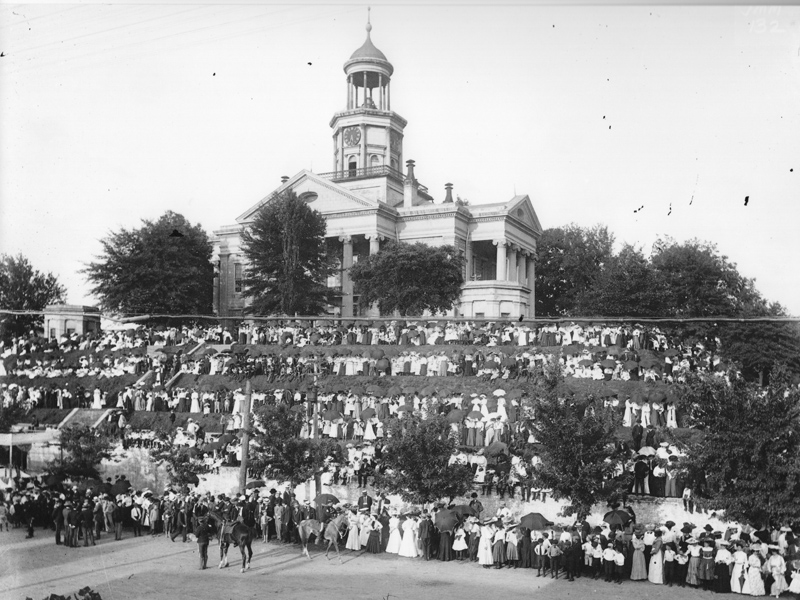Bombs were bursting in air, men were grappling in hand-to-hand combat, shells streaked through the night sky toward the city, but it was in 1916, not 1863 — half a century after the Civil War.
“The Crisis,” the first movie made in Mississippi, was being filmed in Vicksburg. It was a war story, a melodramatic chronicle of a girl torn between two lovers, one who wore gray, the other blue.
And there was a real soap opera that unfolded when the leading lady fell in love with a local swain.
The Selig Polyscope Company, an early film producer, hoped the movie, based on a book by the same name and set in St. Louis, would become a classic. It was produced entirely in Vicksburg with most of the action taking place at the Old Court House, Cedar Grove, Fort Garrott, South Fort and the Hardaway-McCabe house (which stood where Carr Central School was later built).
The star of the show was Miss Bessie Eyton, a raven-haired beauty who was the idol of theater patrons. About 20 other actors and actresses accompanied her, and almost 500 extra roles were filled by members of the Mississippi National Guard and by rank and file of Vicksburg citizens.
One day, Miss Eyton appeared on the set escorted by a Vicksburg man best known as a pool-shooting shark who hung out at Jones’ Smoke House downtown. He was exceedingly handsome.
Another young Vicksburger, 16-year-old Pvy. LeGrande “Doc” Capers, who had fibbed about his age in order to join the Guard, and who appeared in the movie as an extra, remembered half a century later that Miss Eyton, who was probably about 30, looked much older to him and “was not nearly as pretty in person as she was in pictures.”
Her escort, whose name has not been preserved by historians, probably thought differently. He met Miss Eyton quite literally by accident one afternoon when she decided to go horseback riding. She rented a horse at Bazinsky’s Livery Stable, saying she wanted a spirited animal.
When an automobile came down Washington Street, the horse showed more spirit than Miss Eyton had bargained for, and the damsel in distress was rescued by the guy who was loitering at the pool room. He was in the right place at the right time.
The movie soldiers, who were camped on Rifle Range Road, weren’t so fortunate. They were promised transportation and food, but they found themselves hiking long distances on a hot summer day with rifles on their soldiers, then charging the enemy after which they were given a cup of coffee and a sandwich. The fare was poor and so was the pay — $1 a day. The only way to make more money was to play the part of a Yankee, but no Southern boy would don a blue uniform unless the price was right.
The producer chose Vicksburg because he wanted realism, but Capers said he sometimes got more than he bargained for as the troops got caught up in the excitement, clubbing the “enemy” with their rifle butts.
At other times, scenes had to be re-shot when troops got the giggles and townspeople mingled with the soldiers and actors on the set and laughed heartily at almost everything the director said. To them, the $75,000-budget movie was not serious business at all.
One one occasion, to thwart public interferences, a night bombardment scene was filmed from the top of The Valley building. It was too realistic, too reminiscent of 1863, and folks fled panic-stricken into the streets.
Vicksburgers made a social occasion of the filming, entertaining members of the cast in their homes, and the movie company reciprocated by staging a grand ball in the National Park Hotel.
It was a year before “The Crisis” was shown in Vicksburg opening at the Alamo Theater, but to most it was a disappointment — for many scenes had been cut and those who had been extras could seldom find themselves in the crowds.
They weren’t the only ones who were unhappy. A critic in Wid, a New York magazine, thought the film “overburdened with story…tiresome and ineffective…draggy” and the portrayal of Lincoln lacked dignity. The writer objected to the use of patriotic music in the score as people stood, blocking the view. In the South, when the pianist played “Dixie,” the crowds probably stood and cheered just as they did in later years in “Gone With the Wind” when Miss Scarlett shot the Yankee on the stairs at Tara.
To the movie company, “The Crisis” was a disaster as they went broke.
Almost everybody in Vicksburg went to see the movie — everybody except the young man who had rescued Miss Eyton. When she boarded the train to leave, he was with her, so the two rode off into the sunset together. Presumably Prince Charming and Sweet Bessie lived happily ever after.
‘The Crisis’

